AMABHUNGANE
Shaky ground — property magnate, Rali Mampeule embroiled in police investigation of R70m alleged ‘land flip’
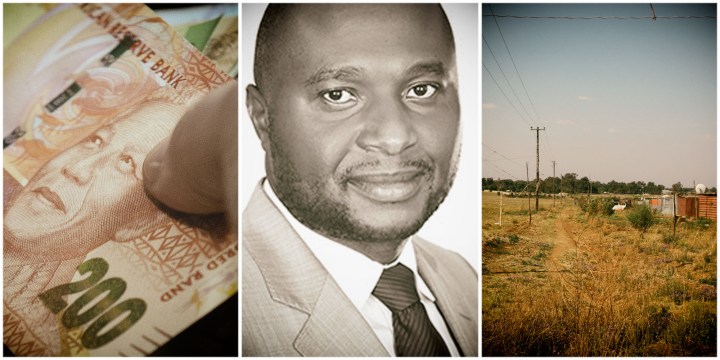
The Gauteng government bought a Midvaal farm for more than 10 times the price it was sold for only a few years before. The R70m transaction was a windfall for the middleman, property tycoon Rali Mampeule, whose company was paid out R44m in ‘commission’ on the deal. Now the police are investigating, but Mampeule insists he’ll be vindicated.
In November 2020, the Gauteng Department of Human Settlements (GDHS) purchased a Midvaal farm with the seemingly extravagant price tag of R70-million that saw a company controlled by property mogul Ralebala “Rali” Mampeule walk away with R44-million in “commission” — a staggering sum at more than 62% of the total transaction.
Of this amount, R2-million was paid to another company as a “finder’s fee”, leaving Mampeule’s company, Landworth (Pty) Ltd, with R42-million.
The deal is under investigation by the Directorate of Priority Crime Investigation (the Hawks) and the Public Protector.
Rali Mampeule
Mampeule, who got his foot in the door of the property industry at international property group Chas Everitt and now owns a sprawling property empire, attempted to deal with queries on an off-record basis, citing the investigations.
He gave us to understand that there was a prior joint venture contract between Landworth and the seller (who received the balance of R26-million) and that Landworth had invested nearly R5-million at risk to develop the property by testing for dolomite and applying to have the land rezoned — and had also sourced a buyer.
He declined to provide any evidence to amaBhungane, again citing the ongoing official probes.
Pressed for a formal response in writing, he replied: “Given that the matter is under investigation by the Office of the Public Protector and law enforcement agencies, we are of a view that the investigation process be allowed to take its course unhindered and that the investigation process is not undermined or compromised by responding to the media query.
“But we are confident that the outcome will be just [and] reinforce that we are not wrong or guilty.”
He said Landworth was “working hard as a company to accelerate delivery of affordable housing in South Africa”.
That claim is open to some doubt in this case.
Terminally ill
The farm in question, portion 77 of Langkuil, is situated in Midvaal and was owned by Douglas Gregory, a farmer and philanthropist who purchased the property in 2016 via his close corporation, DG Industrial Enterprises.
He paid R6.3-million some four years before the property was sold for R70-million, netting his CC just under R26-million after Landworth took its cut.
Gregory was terminally ill at the time and died within a week of the R44-million commission apportionment to Landworth being signed.
According to Gregory’s daughter Cindy, her father had been keen to sell and in his later years wanted to focus on his orphanage in Vereeniging. He faced financial challenges and resolved to sell the least-used properties to fund his philanthropic plans.
But Cindy claims her ailing father was manipulated by George Roper, the lawyer representing Landworth, and Christel Kruger, Douglas Gregory’s associate who managed and was a co-director of an orphanage that Gregory had founded, the McKay Child and Youth Care Centre and Shelter.
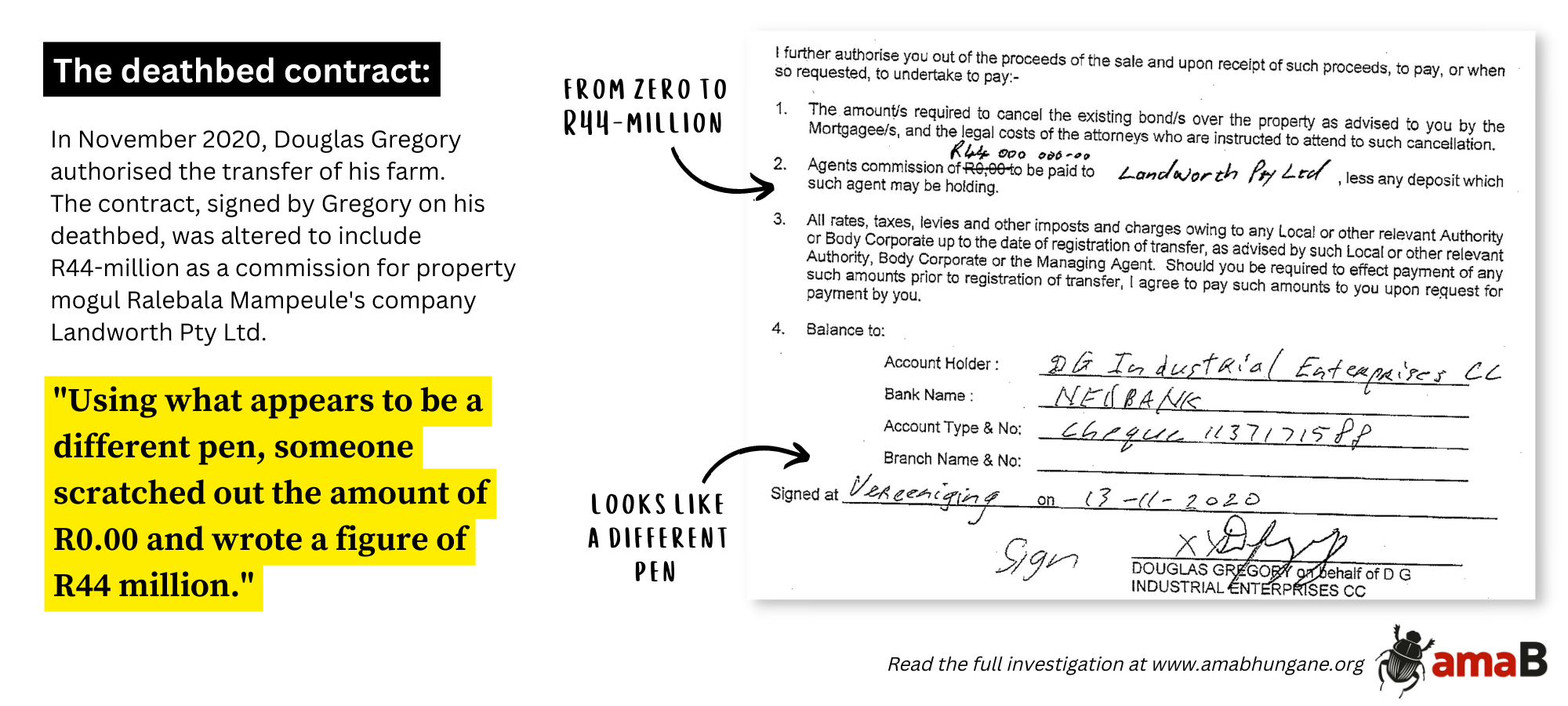 A transfer document dated 13 November 2020 and signed by Gregory contains the line “agent’s commission of R0.00 to be paid to”, followed by a blank space. Using what appears to be a different pen to the one used by Gregory to sign, someone scratched out the amount of R0.00 and wrote a figure of R44-million above and the words “Landworth Pty Ltd” in the blank space.
A transfer document dated 13 November 2020 and signed by Gregory contains the line “agent’s commission of R0.00 to be paid to”, followed by a blank space. Using what appears to be a different pen to the one used by Gregory to sign, someone scratched out the amount of R0.00 and wrote a figure of R44-million above and the words “Landworth Pty Ltd” in the blank space.
By this time, Gregory’s health had deteriorated dramatically and his daughter told amaBhungane she believed his pancreatic cancer was already affecting his cognitive abilities.
She said it was her understanding that when Gregory signed the transfer agreement there were only two other people involved — Kruger and Roper.
Cindy’s version
“What happened was that my dad had asked me to stay because he could not see very nicely. He couldn’t read properly. What happened was that Christel sent me and my fiancé to go get chicken feed. I said we don’t need chicken food because it was still there. But Christel was persistent that I need to go get chicken food. When we came back later, he said Christel had read everything for him and he signed the contract and he’s making R26-million.”
She said he seemed unaware that the total sale price was R70-million.
“He was fighting with me that the contract can’t say R70-million. He was like, no, no, I will speak to Christel when she comes back on Monday.”
But on Sunday morning Gregory was very ill and couldn’t hold down food.
Cindy said, “I took him to Midvaal, and they said there’s nothing they can do… Monday morning, his doctor said there is no point in taking him to the hospital and because he was a family doctor, he booked us a bed in Mediclinic, and George said he will pay for that…
“Christel insisted that George Roper must pay because he signed a contract. The amount was around R25,000 for a week. We had booked him Monday afternoon and on Thursday, 19 November 2020, he died.”
Cindy claimed both Kruger and Roper tried during that week to get her father to sign a new will to place the farm in a trust rather than leave her mother, Kelly Gregory, as sole heir.
“That Monday in the morning, Christel kept pushing my dad that he needs to get his will redone … because Kelly will shut down the orphanage, etc.
“Monday afternoon, when I booked my dad in the hospital, Mr Roper stopped me and said that we need to do your dad’s will. I told him that I don’t think that’s necessary, because everything goes to my mom and if she passes away those things go to us.
“He said my mom is on heavy medications and she cannot handle the trust and the orphanage. I asked him where he was getting this information from … [as] this is not true.”
Responses
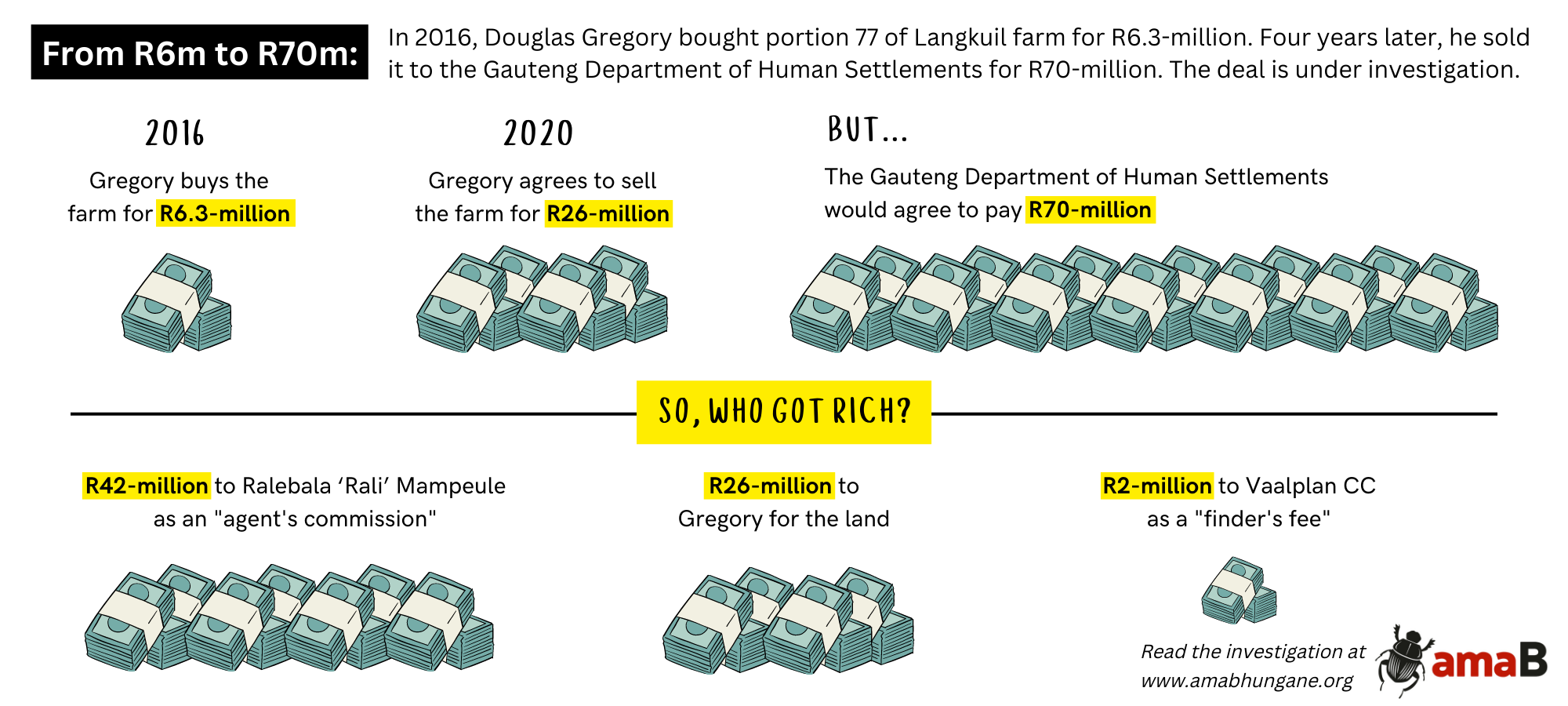
Kruger declined to answer detailed questions. She told amaBhungane, “I know nothing about the above-mentioned. I had nothing to do with any farm. Please ask his daughter Cindy Gregory for all the information… Don’t know where you get your info from, but maybe check your facts. I was the manager at McKay [orphanage] from 2018 until 2021 April; it then closed down; we were all retrenched.”
In response to written questions, the GDHS, Roper, and Mampeule sent almost identical responses. They said they would not provide detailed answers, citing ongoing investigations.
Departmental spokesperson Sithembiso Mkhize said: “The department received a request for information from the Office of the Public Protector and the department duly responded and submitted the required information. The department has also been served with a Section 205 subpoena by the National Prosecuting Authority Specialised Commercial Crime Unit to provide documents related to this matter.
“Given that this matter is under investigation by the Office of the Public Protector and law enforcement agencies, it is our view as the department that the investigation process be allowed to unfold and take its due course unhindered and that the investigation process is not undermined in any way or compromised by responding to media queries”.
Roper’s version
Roper is a veteran lawyer at De Klerk Vermaak & Partners and appears to be associated with Mampeule.
In an August 2019 presentation for the KwaZulu-Natal launch of Mampeule’s SA Housing & Infrastructure Fund, Roper is listed as a non-executive director, although he does not appear on official company registration documentation.
Pushed for a response, Roper did reveal important information, confirming that he had acted on behalf of Landworth (Mampeule’s company).
The lawyer told amaBhungane, “I know that I did nothing wrong and my client did nothing wrong… From the questions you have sent to me I can see that you don’t understand what’s going on in that transaction.
“You must understand one thing: if Douglas hadn’t passed away, we’d never have had this problem, never. That’s the point. You must remember that Douglas bought that farm for R6.3-million and within two years later, his asking price was R26-million, without him enhancing anything of the value of that farm. The children or whatever, they’d never have gotten that if we did not enhance the value of the property. He is my client. He enhanced the value of that property.
“I acted on behalf of Landworth. What I did do was to assist Doug when he asked me. Douglas wanted R26-million for his farm and that’s what we gave him. You must remember my client took the risk of losing at least R2-million for a dolomitic test. He did that at his own risk. We all know that when Douglas passed away, I paid his hospital costs. To me, it is an open and shut case. We’ve got nothing to hide.”
amaBhungane was able to trace the firm that carried out the geotechnical research and produced a report in July 2018. It confirmed it had been contracted by Roper’s law firm and had done work to the value of about R2.2-million.
Vaalplan
The man who got the R2-million finder’s fee threw additional light on the matter, although his version raises further questions about Mampeule’s role and what he had done to earn R42-million of the R70-million paid by the GDHS.
Leon Janse van Rensburg is a director of Vaalplan Town and Regional Planners, which, he explained, is involved in development throughout South Africa.
He confirmed he helped the department find the land.
“Yes, yes. I can still recall very well, it was that period when there were a lot of demonstrations on the R59; if I can recall that village now, it’s called Sicelo township. There was a lot of people demonstrating because there was no land for them where they could live, and you’d not drive on the R59 on various occasions. I got a call asking me if I am aware of land in the area and that’s how it all started, that’s how I got involved.”
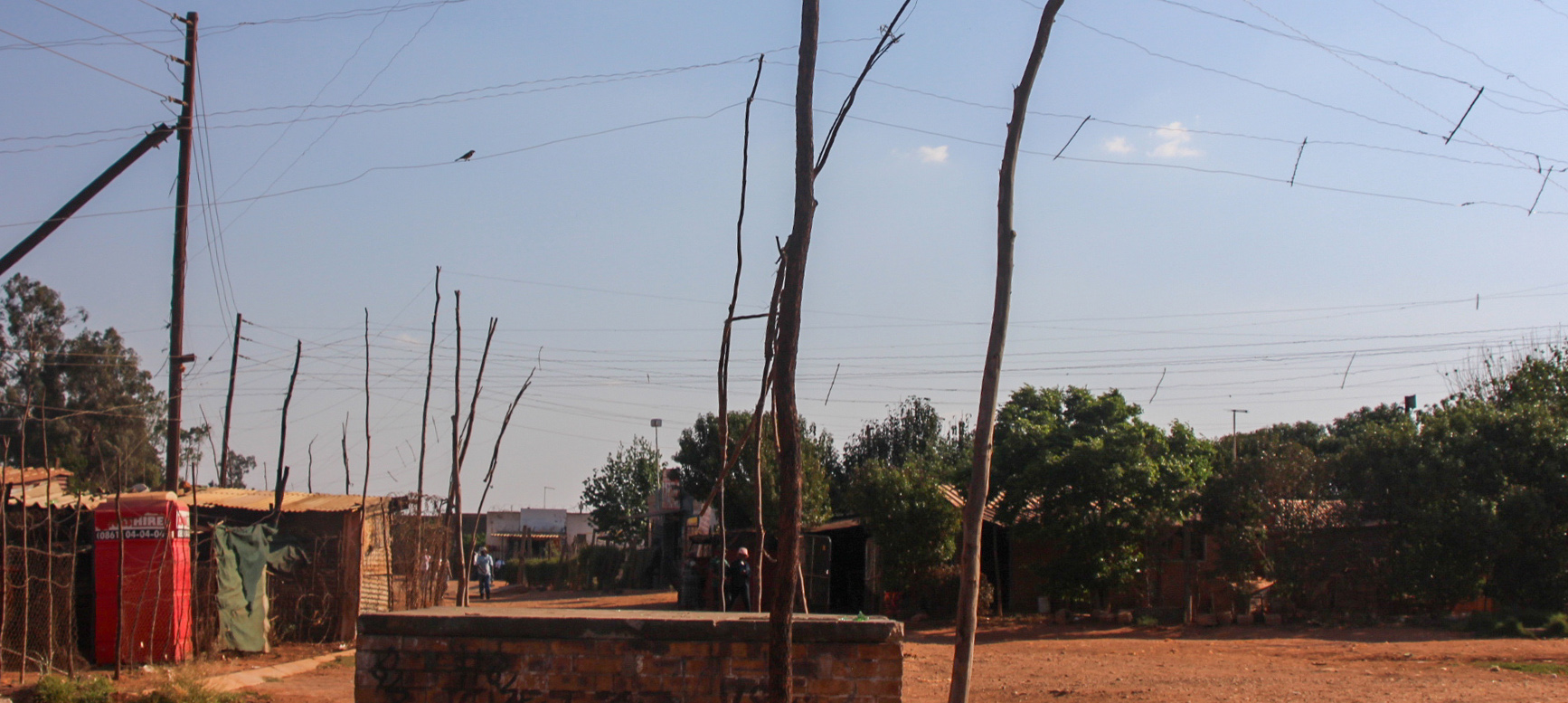
Sicelo settlement. (Photo: Magnificent Mndebele)
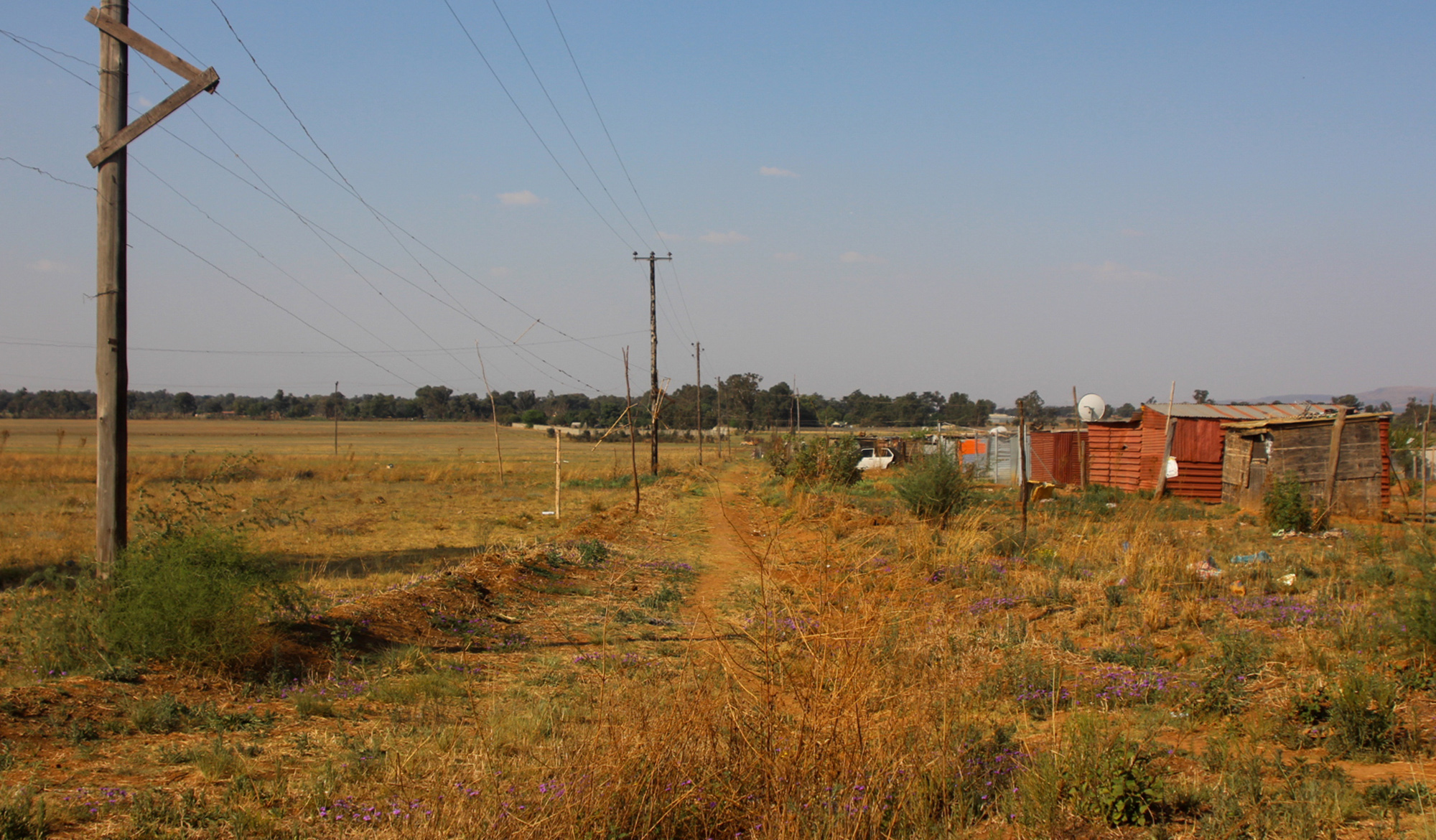
Sicelo bordering portion 77. (Photo: Magnificent Mndebele)
The chaos on the R59 came to a head around October 2017 when the then Gauteng MEC for human settlements, Paul Mashatile, convened an urgent meeting with Midvaal mayor Bongani Baloyi to respond to the housing challenges in Sicelo and adjacent areas.
Van Rensburg said he was called by someone who represented the department, though, initially, he would not disclose who this was.
He was also surprised to hear that the land was sold for R70-million — as the finder’s fee was normally in the range of about 10%.
“If I sell land for R70-million, my finder’s fee would not be around R2-million. It’d be much more… I don’t know of R70-million really. I’ve never seen anything like that, and I don’t know where you got that from. It is news to me.”
Later he told amaBhungane he had checked his documents and was able to bolster his recollection.
“I got the instruction to find the property from the director of Landworth. He is an agent or acting on behalf of [the Gauteng Department of] Human Settlements, I don’t know exactly what their relationship is, but he is working for human settlements.
“I think Landworth has been commissioned by the department to assist in that matter, but I don’t really know what their relationship is.”
That question is key to understanding what could justify the enormous inflation in the property price and the eyewatering fee paid to Mampeule, even if he did spend money on laying the groundwork.
From what amaBhungane saw when we visited Gregory’s farm, the R70-million price tag is hard to justify.
The GDHS planned to turn the farm into a township housing about 4,000 families, but two years after the purchase there is still no sign of development.
Midvaal municipality
The assistant director for communications at Midvaal, Kagiso Korae, told amaBhungane the project belonged to the GDHS but the application to establish a formal township had yet to be submitted.
“The proposed development is initiated by the Gauteng Department of Human Settlements. The department is therefore responsible for all the necessary studies, including the Geotechnical report, flood line studies, environmental impact assessment and the whole feasibility of the project. Therefore, all the other enquiries about the procurement of the land and suitability of the land for development should be referred to GDHS.
“Midvaal will be responsible for the evaluation of the township establishment application once submitted as outlined above,” added Korae.
amaBhungane spoke to two senior sources within the municipality who requested to speak on condition of anonymity.
Both sources questioned the R70-million price tag.
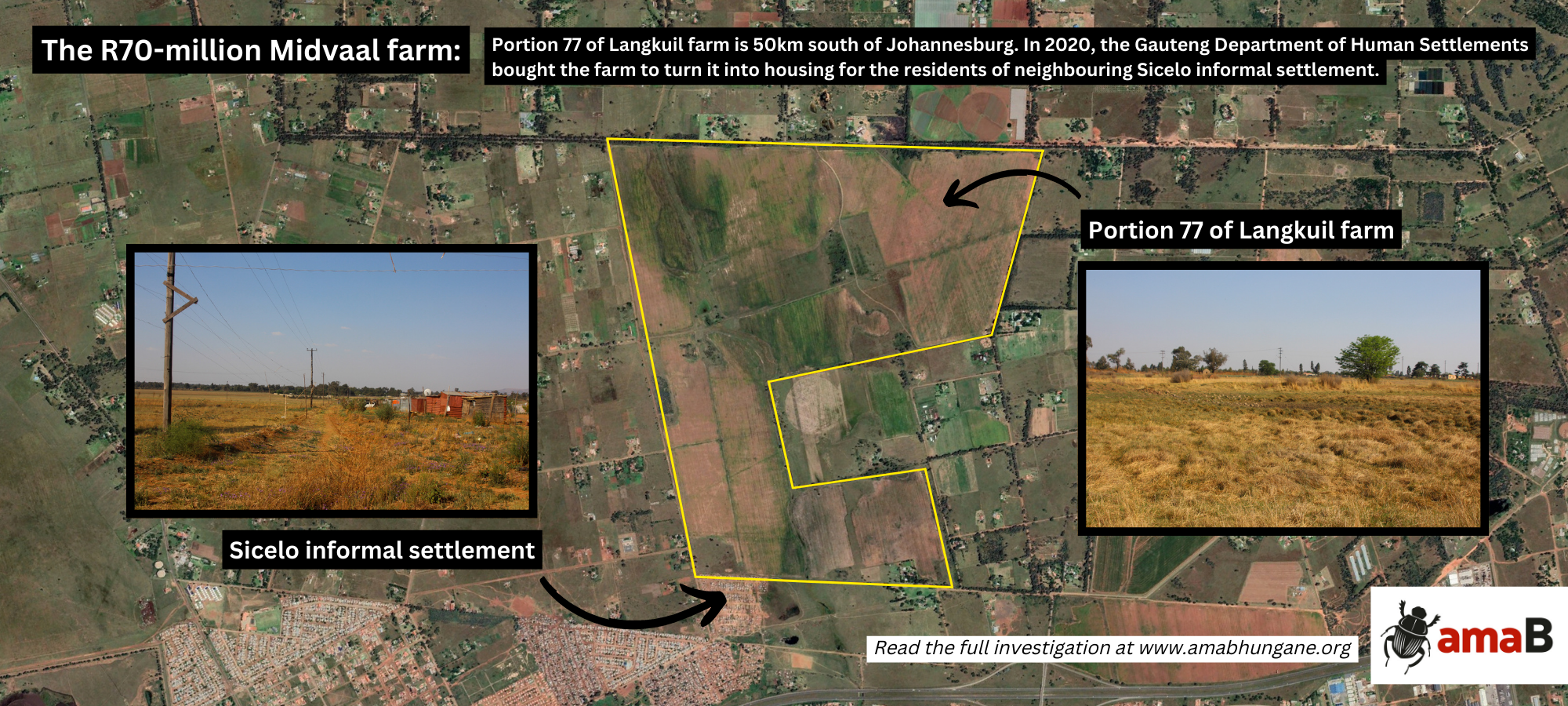
As of now, portion 77 of Langkuil farm was still zoned for agricultural purposes, said one.
“Even if the land was put on the urban development boundary, that’s as good as a line on a map… If the zoning rights were already there … that could have given the property a better valuation, but there was nothing justifying that amount.”
The source said that the GDHS approached them to enquire if it made sense to purchase the property so that the people of Sicelo informal settlement could be relocated to proper housing.
They endorsed this idea, the source said, because the growing informal settlements, especially at Sicelo, remained a thorny issue for their image as a municipality.
The other source, who is more senior, said the provincial government was pushing to finalise the sale; however, soon after the sale was finalised that enthusiasm dwindled dramatically.
Not fit for purpose?
There are also concerns that the farm’s proximity to the giant Metalloys manganese alloy smelter makes it unsuitable for a planned urban development.
The University of the Witwatersrand and Washington University in the US conducted a joint study between 2016 and 2017 to assess the health impacts on people living near the Samancor-owned plant.
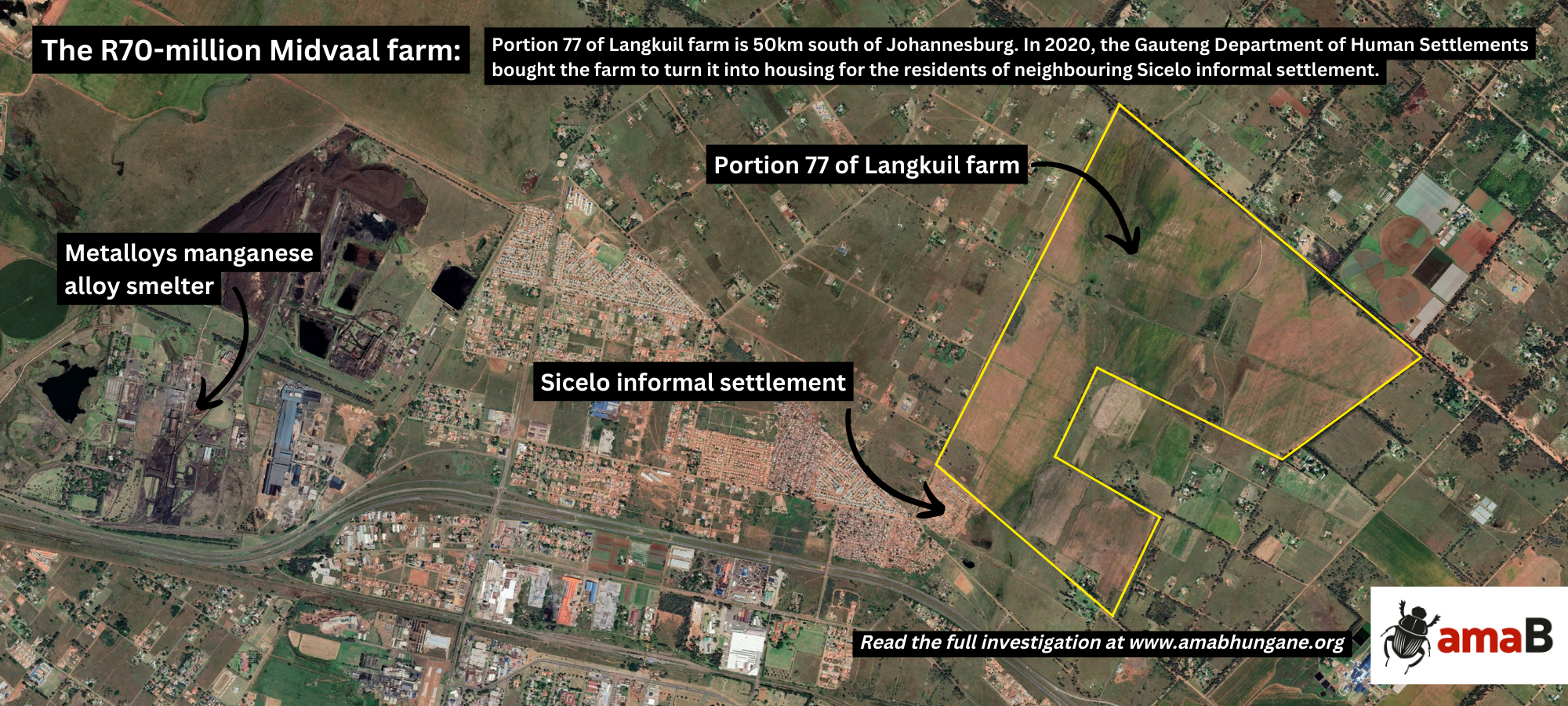
“We were alerted to the problem of the pollution from the ferromanganese smelter via the Department of Environment, and some residents in the community. We were interested to find out if relatively low levels of manganese were associated with Parkinsonism,” said the head of the occupational health division at Wits, Gill Nelson.
Study participants in the manganese-exposed community, Meyerton, lived in one of three settlements — Old Sicelo, New Sicelo, and Noldick.
Nelson told amaBhungane that the highest average concentration of manganese in Meyerton’s air was slightly above the US Environmental Protection Agency’s upper limit.
The respirable manganese levels in the control area not affected by the industrial activity “were about 20 times lower” than the levels for the affected areas, according to Nelson.
There are no legislated environmental manganese levels in SA, only for total dust.
There are legislated occupational manganese levels, Nelson explained, though these were much higher than those measured in Meyerton.
Nelson added that in their study they found out that the Meyerton study participants had poor cognitive and motor functions relative to the control group. “The mean score for Parkinsonian signs was 2.5 times higher in the Meyerton residents than in the control group,” said Nelson.
Environmental activist Melanie Mandy, who did fieldwork for the study, said: “The water, the air and the ground are contaminated. Portion 77 is in the same belt, same horizontal path and same distance from Samancor Meyerton Works. So how on Earth can portion 77 be a more suitable place for these people to move to while the local municipality is fully aware that this entire area, the ground and the water is contaminated with manganese?” DM
amaBhungane is a non-profit centre for investigative journalism. We co-publish our investigations, which are free to access, on news sites like Daily Maverick. For more, visit us at www.amaB.org.















 Become an Insider
Become an Insider
Stealing tax money from tax payers is as bad as it gets..
Stealing money from folk on their deathbed is a new low for people from south africa but with a background working for a domestic property company, I can see where he learnt his trade.
The ANC doing what it does best, LOOT!
Well done, Magnificent! A great piece of investigative journalism. Please keep us informed as this develops. Hopefully the “commission” will be repaid and the GDHS will do its job to develop proper housing in a safer environment for the residents. I wonder who set the “asking” price of R26m?